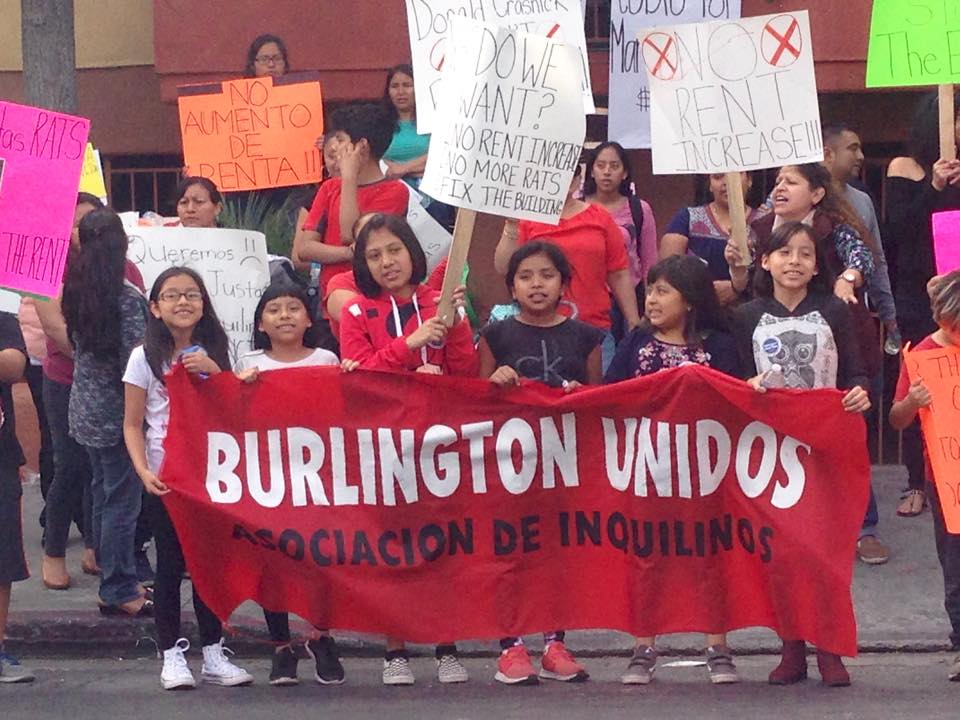[dropcap size=big]R[/dropcap]ent is normally due the first of the month, but this June 1, and for three months prior, a growing group of over 90 families who live in large apartment complexes in Westlake is withholding their rent from a wealthy Pacific Palisades attorney in protest of severe rent increases.
The case is the latest flashpoint in the housing crisis in Los Angeles. What’s been described as the biggest rent strike in recent Los Angeles history is being waged by more than 200 individuals, including some 50 children, and the group is now facing one of the biggest mass evictions in the city’s recent history.
The tenants of three adjacent apartment buildings on South Burlington Avenue in rapidly gentrifying Westlake are combatting what they claim are unjust rent increases from their landlord. In the process, they are facing being evicted by attorney Lisa Ehrlich, who has refused to negotiate over their main demands: rent increases of four percent or below, and a guarantee that the rent will not be raised for another two years.
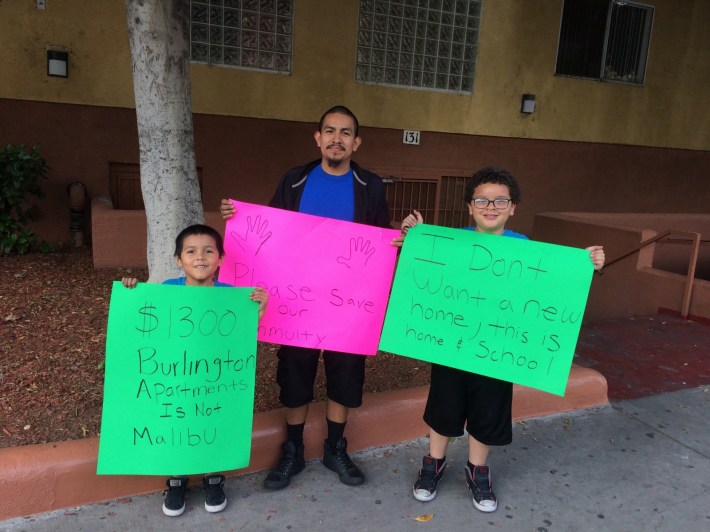
Disagreements between tenants and landlords are not uncommon in L.A.’s housing market, where it’s becoming more and more difficult to find an affordable home. Renting in L.A. can take up to 70 percent of a tenant’s income. Then comes the complex issue of race — those who own the Burlington apartments are white, while the majority of the tenants facing eviction are immigrants from Mexico and Central America and primarily speak Spanish. It’s the sum total of discrete actions like these that resulted in Latino homelessness rising by 63 percent from 2016 to 2017.
RELATED: Snapchat Is Pulling Out of Venice, and Gentrification Activists Are Overjoyed
But this is also a story of courageous and radical resistance by renters who have no other option but to fight back; individuals, inspired by a growing tenants movement, organizing themselves into a collective unit to challenge the amoral logic of our real estate market in which wealth, above all else, determines access to shelter. The battle isn’t over yet.
In January, every single tenant of the 192 units at 131, 143, and 171 S. Burlington Avenue was informed that his or her rent, starting in March, would be increased by between 25 to 45 percent, a number confirmed by Trinidad Ruiz of the Los Angeles Tenants Union. This shocked the tenants. All of them, but especially those in 131, claimed that no upkeep was done to justify such increases. At rallies and on social media they’ve voiced concerns about and shown pictures of rats, roaches, broken elevators, faulty plumbing, cracked walls, and caved-in ceilings. However, the rent increases were entirely legal because the buildings are not covered by L.A.’s tricky rent-control ordinance since they were built after 1978.
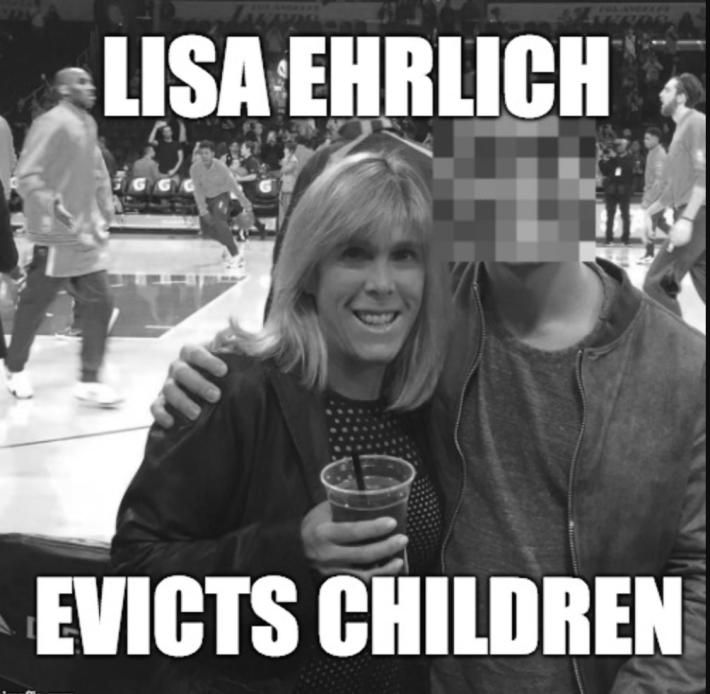
Jorge Juan, a tenant who lives with his wife and two kids, saw his monthly rent go from $950 to $1,350 per month, a 37 percent increase. He’s especially concerned about the impact this would have on his children, who go to elementary school right across the street. “We just want them to be able to learn,” he says, “and not to be worried about a meal for tomorrow because all of our money is going to the rent.”
Others, like Ana Zepeda, who lives with her three children and whose rent was also increased to $1,350 per month this year, on top of a separate $100 increase two years prior, simply cannot afford to pay the higher rate. She earns only about $300 per week and says she may have to leave the state entirely if the tenants lose this fight.
The apartments are owned by 1979 Ehrlich Investment Trust, a corporate entity started by Lisa Ehrlich’s step-father, Richard Ehrlich. The Ehrlich family owns several other properties throughout the region, including a $4 million home in Venice, a 5-acre plot of land in Nevada, and this 43-acre waterpark in Fresno. The “trustee” of these buildings — meaning the person legally responsible for making decisions about the rent increases and evictions — is Donald Crasnick. Ehrlich as their attorney is heavily involved with the legal decision-making.
RELATED: Why Locals in Historic Filipinotown Are Bracing For Gentrification
After the rent increases, the tenants quickly organized themselves and started to weigh their options with help from Elena Popp, of the Eviction Defense Network, who’s now serving as their attorney, and the Vermont and Beverly (VyBe) Local of the Los Angeles Tenants Union. In late February, tenants from 36 units, mostly from the 131 building, decided they would withhold their monthly rent beginning in March, thus kicking off the rent strike. Tenants from 54 units decided to join them beginning in April, bringing the total number of striking units to 90, comprising over 200 individuals in total.
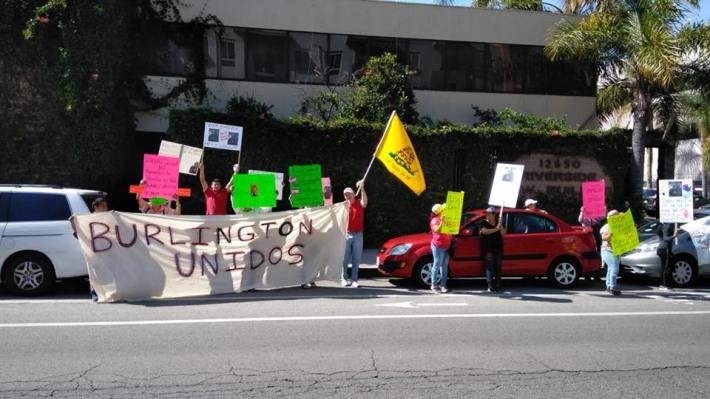
Amounting to over $100,000 monthly in lost income for the investment trust, the idea behind the rent strike was to force Ehrlich to come to the table for a conversation. In addition to the completion of what they see as necessary repairs, the tenants are demanding lower rent increases and a guarantee that the rent would be relatively stable for several years — similar to the contract won by the Mariachis in Boyle Heights.
This strike always entailed a huge risk, but many of the tenants firmly believe that they have a legal basis for withholding rent due to the substandard conditions of the property. Popp says that there is a failure on the part of the landlord to provide “habitable dwelling units.” But if the units are found to be suitable by the court, refusing to pay rent is an evictable offense.
RELATED: ‘This Side of Hoover’ Is Archiving Gentrification In East Hollywood, One Portrait at a Time
When Ehrlich refused to budge, for two days in a row, large groups of tenants showed up to protest outside her office in the Valley and at her $4 million gated home in the Pacific Palisades.
Ehrlich still would not meet them even halfway.
On May 16, the tenants and their supporters, some 50 in all, staged their most disruptive action yet, showing up at a musical performance that Ehrlich was attending, repeatedly chanting “stop the evictions” outside the venue until she snuck out the back into a getaway Mercedes Benz. The next Sunday, over 50 tenants showed up to the Pacific Palisades farmers market to inform Ehrlich’s community of the situation and to ask that they send an email urging her to allow them to stay in their homes. There are plans to return to the farmers market this coming Sunday, June 3.
Trials for some have already started. The courts have decided to expedite the trials for the rest, reserving three separate rooms at the Stanley Mosk Courthouse exclusively for tenants who began the strike in March. These start on June 4.
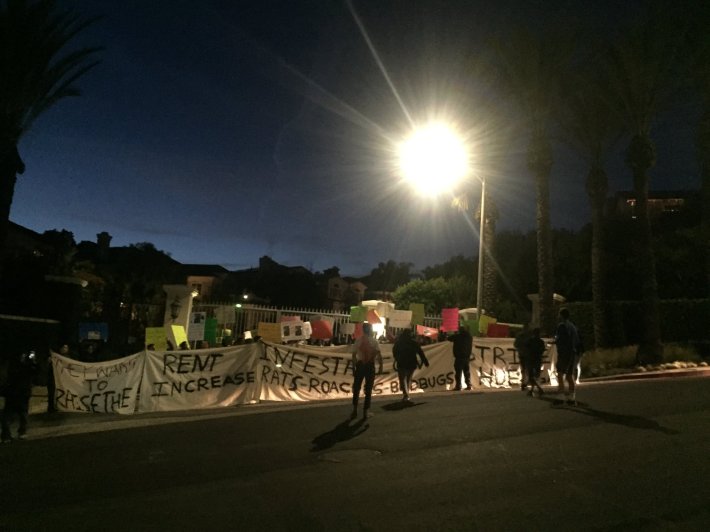
Ehrlich did not respond to requests for an interview for this story but gave the following statement about the situation:
On March 27, 2018, I wrote to tenants' counsel Elena Popp. I requested that Ms. Popp provide a specific list of all items that the tenants alleged required repair. I wrote that management would immediately address those issues. Ms. Popp affirmatively refused to provide a list. Additionally, on April 2, 2018, via email, I invited Ms. Popp to engage in settlement negotiations to resolve all issues indicating that I would be available at her convenience. She has chosen not to respond.
The Burlington apartments have been profitable for Ehrlich and her family. They were bought by the Trust in 1994 for a total of $8.42 million, and the 192 tenants were collectively paying well over $2 million per year in rent even before the recent increases. Total property taxes in 2016 for the buildings were just $106,572. Ehrlich has repeatedly defended her decision by pointing to rising trash collection fees, but it is unlikely that these amount to much more than a hundred thousand dollars per year.
RELATED: These Old-School Shops in Highland Park Just Heard Their Rent Will Rise By 250 Percent
Ultimately, a situation like this — with over 200 people facing the prospects of being kicked out of their homes — can only happen in a system that treats shelter as a pure commodity, leaving tenants subject to the whims of profit-seeking owners. Strong, universal rent control would stop evictions like these in their tracks, protecting vulnerable renters and stabilizing communities of color, which are being banished from the urban core. The Burlington tenants now must hold out hope that Ehrlich recognizes their common humanity and comes to the negotiating table.
